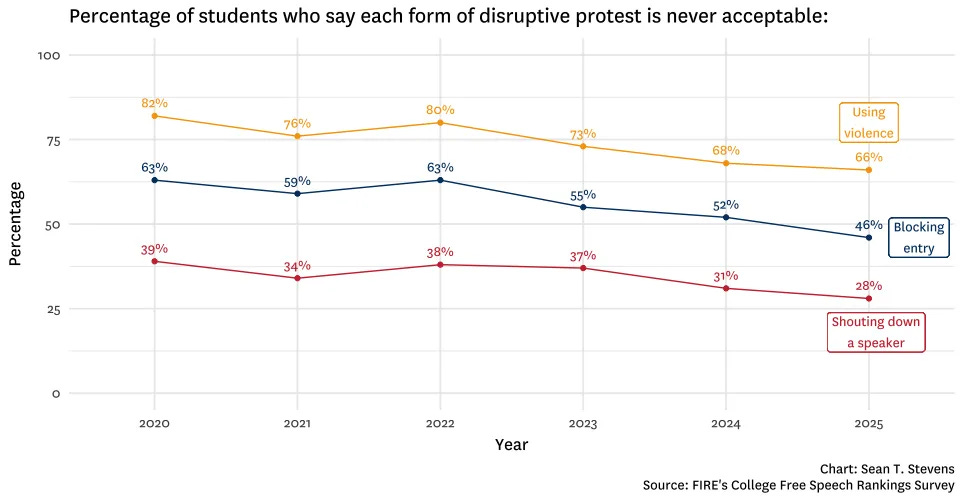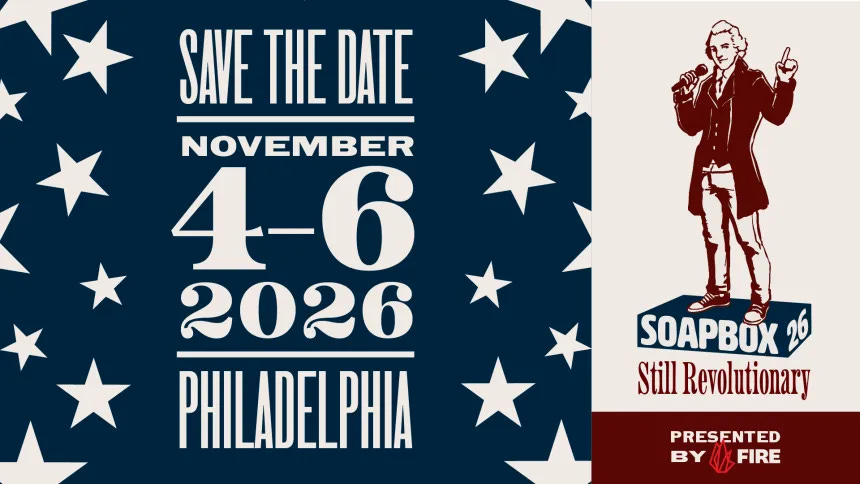Jimmy Kimmel jawboned out of work, me in The Free Press, & more!
Bringing you the latest free speech news (9/21/25)
Stories of the week
For years, I’ve warned that equating words with violence erases the bright line liberal societies drew after centuries of bloodshed. The law draws this line with precision. Advocacy, even vile advocacy, remains protected unless it is intended and likely to produce imminent lawless action. That’s the Brandenburg standard, and it exists because the alternative is to let the powerful decide which ideas are allowed.
The FCC has no authority to control what a late night TV host can say, and the First Amendment protects Americans’ right to speculate on current events even if those speculations later turn out to be incorrect. Subjecting broadcasters to regulatory liability when anyone on their network gets something wrong would turn the FCC into an arbiter of truth and cast an intolerable chill over the airwaves.
This week in ERI
Kimmel’s ouster proves that our speech is already being chilled, with every action of administrative censorship dropping the temperature another degree. That chill won’t stop at the late night talk shows; it has already seeped into newsrooms, and will no doubt spread into documentaries and local programming decisions everywhere.
This week in Expression
The idea that “hate speech” is a separate and unprotected category of expression is one that we, unfortunately, have had to debunk time and time again. The fact is there is no “hate speech” exception to the First Amendment, and there can’t be. The Supreme Court has rejected the notion on multiple occasions, and the reasons for this should be obvious to someone in Bondi’s position.
Is hate speech protected by the First Amendment? by David Hudson
We are losing the basis of our civic discourse by Samuel J. Abrams
This week on So to Speak
This week, Nico Perrino sat down with award-winning author Charles Slack to talk about the Sedition Act and his new book, Liberty’s First Crisis: Adams, Jefferson, and the Misfits Who Saved Free Speech.
And because it was that kind of week, FIRE staff sat down for a webinar on Charlie Kirk’s assassination last week in Utah, the cancel culture fallout, Attorney General Pam Bondi’s comments on hate speech, and President Trump’s lawsuit against the New York Times.
This week in FIRE’s blog
On November 4–6, 2026, in the birthplace of liberty, Philadelphia, join FIRE for three unforgettable days of fearless conversations, sharp debates, and incredible entertainment that you won’t want to miss!
Why RICO can’t be used to punish speech by Greg Harold Greubel
You can’t fire your way to free speech by Connor Murnane
As government actors, public colleges are bound by the Constitution. Whether it is criticism of George Floyd in 2020 or Charlie Kirk today, the First Amendment protects speech, no matter how crude, offensive, or ill-timed some may perceive it to be.
Moments like these test our commitment to free expression. When a college caves to outrage, it invites more censorship and sends the message that no speech is safe. Punishing speech some deem offensive only moves the line of what’s “unacceptable” inward, constantly shrinking the already fragile space for debate.
How Gov. Shapiro’s role at Penn puts free speech and institutional autonomy at risk by Michael Hurley
In the wake of Charlie Kirk’s assassination, colleges must not burden speaking events
FIRE in the press!
The difference between words and violence — and the civilizational importance of free speech — couldn’t have been more stark in that moment. No matter how hurtful, hateful or wrong, there is no comparing words to a bullet.
To preserve that distinction, we must have the highest possible tolerance for even the ugliest speech. But that notion has landed on largely deaf ears, because what followed was a cacophony of cancellations.
Texas A&M lecturer’s firing just part of a sinister trend (Houston Chronicle) by Lindsie Rank
Jimmy Kimmel's ouster is just the tip of the iceberg (Washington Post) by Bob Corn-Revere
But do you know what else has no place in a free society? A government official presuming he can police jokes told on late-night television based on his political preferences.
Carr once professed to believe that too. In 2019, he tweeted: “Should the government censor speech it doesn’t like? Of course not. The FCC does not have a roving mandate to police speech in the name of the ‘public interest.’” But that was then, and this is now. Serving as President Donald Trump’s apparatchik FCC chairman, Carr toes a new party line that is quite different.
London Calling: Ronnie’s First Amendment Roundup
Sixth Circuit offers timely reminder that the bar for adverse state action for First Amendment retaliation is not a high one, and that plaintiffs of firm resolve can still claim chill even if they keep speaking
In a dispute over a seasonal boat dock and whether a town official unconstitutionally retaliated against its owners, the Sixth Circuit affirmed dismissal of takings, inverse condemnation, and state preemption claims, but reversed and reinstated those sounding in the First Amendment and selective enforcement. Plaintiffs own a home near a Michigan lake where they have a dock they used for years, but got sideways with Zoning Administrator Nerad, who invoked local ordinances against the dock’s placement—citations the plaintiffs claim retaliated for a prior suit they filed challenging town rules for how residents use the lake and shoreline. While the parties agreed filing the prior lawsuit was protected First Amendment activity, Nerad claimed his citations were not “adverse action” as needed for a retaliation claim because he was simply enforcing town ordinances. But the court held a jury could find the citations would deter a person of ordinary firmness from filing a lawsuit challenging his conduct as a town official. As the court explained: “True, Plaintiffs themselves have not been deterred. After all, they have brought this second federal lawsuit against Nerad. But the test is an objective one, not a subjective one.” And, “a reasonable juror could … find that the concomitant issuance of citations, imposing the threat of hundreds to thousands of dollars in fines, would deter … filing a lawsuit challenging the citing official’s conduct,” especially given that “to challenge a ticket the recipient must engage in time-consuming and potentially costly administrative or judicial machinery.” The court held that, for similar reasons, Plaintiffs alleged a viable claim that Nerad selectively enforced the ordinances by ticketing them, while declining to ticket other similarly situated individuals for the same conduct, and that Nerad's purpose was to discriminate against them for exercising their First Amendment rights. And as a kicker, the court held that to the extent presence of probable cause to believe a law (or ordinance) was violated can defeat a First Amendment retaliation claim based on arrest and/or prosecution, the same may not hold true for actions “of the civil variety” like the citations here. With all these useful points of First Amendment retaliation law, it’s a pity the decision appears destined for unpublished status.
International free speech stories of the week
Four arrested after Trump, Epstein images projected onto Britain's Windsor Castle (Reuters)
Police must stop criminalising offensive tweets, says Home Secretary (The Telegraph) by Charles Hymas
Ms Mahmood told MPs at her first Home Office questions in the Commons: “I’m absolutely clear that there is a line between content that is offensive, rude, ill-mannered, and incitement to violence, incitement to hatred.
“Those are crimes and it is important that we police that line between these types of comments effectively, so that everybody in this country can have confidence in our policing system, but also confidence in exercising their rights under the law of our land.”
Scientists urge EU governments to reject Chat Control rules (Silicon Republic) by Colin Ryan
Gov't Says It Will Cut Israel Film Academy Funding After Film 'Depicting Israel Negatively' Wins (Haaretz) by Ido David Cohen
Interview of the week
What a week! Unless you’re living under a rock, no matter where you get your news you’ve probably seen FIRE’s research cited or seen or heard a FIRE spokesperson weighing in on the rapidly developing free speech news that’s been coming at us like a fire hose since last week. Here’s just one interview I did on Friday with CNN.








If Trump's FCC chair hadn't said anything Kimmel still would have been pulled off the air, but we wouldn't be talking about the distraction of jawboning. Way to snatch defeat from the jaws of victory, guys.
If you want to see a humorous illustration of the danger of repression of expression, see Jon Stewart's cowering conduct (right out of 1984). I thought it was well worth the time to watch the whole clip. https://www.youtube.com/watch?v=_GXNJ3V9lzg
Stewart showed some truly astonishing clips of Trump. I wasn't laughing then. I was sad--for America. When I saw Trump barely manage to read his "praise" for UK luminaries and then mutilate the names of two countries (which he apparently had "prepared" to speak about), I felt the same sadness, shame and concern (for us) as when I saw Biden during the debate.